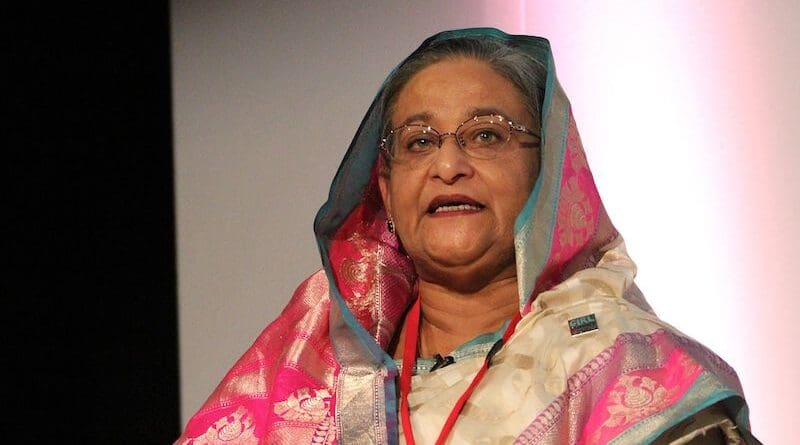Bangladesh: Hope Is Fading For Democracy – Analysis
By Saimum Parvez
On 7 January 2024 the incumbent Awami League (AL) was re-elected in Bangladesh in an election that was neither free nor fair. The election was described by the international media as a bad day for democracy and a charade, while many doubted the legitimacy of the election results. Due to major opposition parties’ boycott of the election, only the AL and its affiliates competed. For the competing candidates, winning the elections was dependent on pre-election negotiations with the ruling party.
The lead-up to the election was rife with protests and counter-protests by the opposition and ruling parties. The opposition, led by the Bangladesh Nationalist Party (BNP), drew huge crowds to Dhaka and other urban centres.
Their key demand was the establishment of a neutral, interim caretaker government to oversee the election. The opposition’s demand was grounded in previous controversial and rigged elections in 2014 and 2018 under the regime of AL Prime Minister Sheikh Hasina. In contrast, the four elections held under a caretaker government in 1991, 1996, 2001 and 2008 were recognised as free, fair and credible. The opposition and a section of the civil society have been demanding the reinstatement of the caretaker government system since the AL abolished it in 2011.
US Secretary of State Antony Blinken announced a new visa policy in May 2023 that ‘restrict[s] the issuance of visas for any Bangladeshi individual, believed to be responsible for, or complicit in, undermining the democratic election process in Bangladesh’. This seemed to invigorate opposition leaders and activists, who hoped that the 2024 election would be different to 2014 and 2018 with the international community watching more closely.
The visa restrictions also attracted attention from Russia and China, who sided with the Hasina regime and condemned ‘Western interference’ in Bangladesh. India, Bangladesh’s influential neighbour, has also supported the Hasina regime thanks to its business and security interests in Bangladesh.
In this game of influence the real losers were the people of Bangladesh, who have been deprived of their democratic rights for more than a decade. In October 2023 the Bangladeshi government began a violent crackdown and subjected millions to show trials on trumped-up charges. In addition to arrests, custodial deaths and extrajudicial killings of opposition leaders and activists, the incumbent government expedited judicial persecutions in fictitious and politically motivated cases.
At least 27,000 opposition activists and leaders have been jailed and more than 100,000 political activists have been charged since August 2023. Journalists, cartoonists and social media activists have been charged, arrested and imprisoned under the now-scrapped Digital Security Act.
When the opposition BNP and 62 other political parties boycotted the 2024 election, the main challenge for the ruling AL was to make the election look participatory. The ruling party propped up dummy candidates to give the election a competitive veneer for the international community. The independent candidates, who were themselves ruling party leaders, were strategically planted to show some non-AL victories. But the fact remains that every candidate was a member of the AL or an AL affiliate.
On the morning of election day, polling stations were empty all over the country. Just before foreign observers visited, people repeatedly came and stood in polling lines to create a false appearance of voter participation. There were rampant cases of ballot stuffing and even minors were observed casting votes. Despite the empty polling stations and boycotts, the Election Commission claimed a turnout of 41.8 per cent.
Among the 298 elected members of parliament, 295 were either officially nominated by the ruling party, were independents who were in fact members of the party, including former ministers and parliamentarians, or were members of the allied Jatiya party.
Bangladesh witnessed several economic downtrends in 2023, including a hike in the cost of living, inflation, declining foreign reserves and rampant corruption. The extremely low voter turnout could be seen as a sign of public dissatisfaction with the current regime’s economic mismanagement. Garment workers protested in 2023 to demand wage hikes and these protests were violently crushed with police killing several workers.
Any democratic government would be fearful of this kind of economic mismanagement and brutal repression if there were fair elections where people were able to vote against the incumbent. But since the main opposition party boycotted the election, people had only one choice left to express their dissatisfaction — not showing up to vote.
Despite the visa restriction policy, several high-profile delegation visits and letters sent to major political parties, the United States’ attempts to ensure free and fair elections did not materialise. After the flawed election, the United States issued a somewhat timid statement declaring that the elections were ‘not free and fair’. The United Kingdom also stated that the standards of credible, open and fair competition were not consistently met during the election period.
But the Western world has also expressed interest in working with the Bangladeshi government. As the current government is increasingly leaning towards China, 2024 could witness a stronger Chinese footing in the country. Domestically, the mounting authoritarian tendency of the one-party government, deteriorating economic conditions and a worsening energy crisis could give rise to violent unrest in 2024.
- About the author: Saimum Parvez is a Marie Curie Postdoctoral Research Fellow at Vrije Universiteit Brussels, Belgium.
- Source: This article was published by East Asia Forum

